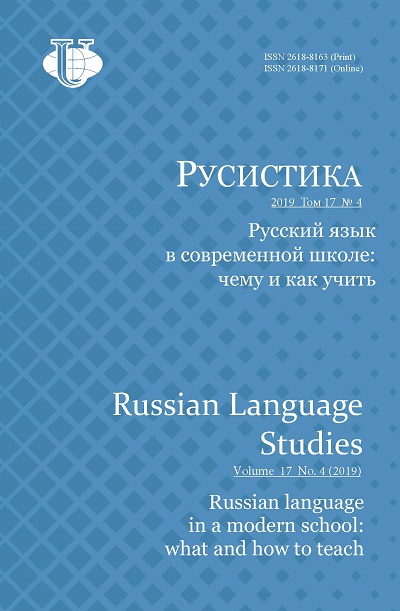Event-driven approach to teaching Russian to schoolchildren of the Russian Ministry of Foreign Affairs
- Authors: Leppik S.A.1, Ustinov A.Y.1, Chabanets T.A.1
-
Affiliations:
- Secondary school under the Embassy of Russia in Vietnam
- Issue: Vol 17, No 4 (2019): RUSSIAN LANGUAGE IN A MODERN SCHOOL: WHAT AND HOW TO TEACH
- Pages: 445-459
- Section: Methods of Teaching Russian as a Native and Foreign Language
- URL: https://journals.rudn.ru/russian-language-studies/article/view/22434
- DOI: https://doi.org/10.22363/2618-8163-2019-17-4-445-459
- ID: 22434
Cite item
Full Text
Abstract
The article is devoted to teaching the Russian language to the pupils of schools at the embassies of the Russian Federation and the necessity of using the event-based approach for forming and improving communicative universal educational activities (hereinafter UEA). In modern educational reality, when children become pupils of multi-ethnic classes in Foreign Ministry schools regardless of their proficiency in the Russian language, it is necessary to create conditions allowing to form their communicative competence not only at Russian language lessons, but also in extracurricular time. One of conditions of learning Russian is the use of event-based approach to organizing language education, in particular, participation in network projects of Russian Foreign Ministry foreign schools’ interaction. The theoretical significance of the article lies in the fact that due to the conceptual properties of the event approach, its necessity and effectiveness for improving communicative UEA in a multi-ethnic school are justified. The practical significance of the article is that within the framework of the event approach, a model of a network project for Foreign Ministry foreign schools with rhetorical competencebased tasks has been developed. The model allows to achieve a synergetic educational effect in Russian language learning. The described educational event for pupils results in discovering personal and subject meanings through communication, as well as understanding the value of their own speech experience in Russian. The authors conclude about the need to use the event-based approach in a multi-ethnic school, which allows to create an open communicative situation in the Russian language. The directions of further scientific and methodological work could be expanding the list of communicative educational events implemented within this approach, creating the guidelines and their implementation in the practice of multi-ethnic schools.
About the authors
Sergey A. Leppik
Secondary school under the Embassy of Russia in Vietnam
Author for correspondence.
Email: hanschool@mail.ru
директор школы при Посольстве России во Вьетнаме, почётный работник общего образования
Russian FederationAnatoly Yu. Ustinov
Secondary school under the Embassy of Russia in Vietnam
Email: ustan0902@rambler.ru
доктор педагогических наук, доцент по кафедре языкознания и методики преподавания русского языка, учитель русского языка и литературы школы при Посольстве России во Вьетнаме
Russian FederationTatiana A. Chabanets
Secondary school under the Embassy of Russia in Vietnam
Email: chabanec@inbox.ru
кандидат исторических наук, доцент по кафедре психологии управления, завуч школы при Посольстве России во Вьетнаме
Russian FederationReferences
- Butenina, O.E. (2015). From experience in the implementation of the event-driven approach in the conditions of GEF NOO. Science and education: new time, (5), 4—10. (In Russ.).
- Dubova, M.V. (2010). Competence task as a means of practice-oriented education of primary school students. Competence approach to professional training of the future teacher. Proceedings of IV AllRussia scientific-practical conference for teachers of higher education (pp. 192—195). Moscow: Balass Publ. (In Russ.).
- Fung Chong Toan. (2017). To the discussion about the present and future of the Russian language in Vietnam. Russian language Week in Vietnam: Proceedings of the conference (pp. 5—13). Hanoi Publ. (In Russ.).
- Gavrilenko, A.Yu. (2017). Modelirovanie urokov po orfografii v klassakh s polietnicheskim sostavom uchashhikhsya (5 klass) [Modeling of spelling lessons in classes with a multi-ethnic composition of students (grade 5)]. (Candidate dissertation, Moscow). (In Russ.).
- Konkurs setevykh proektov «Obuchayas’ — tvorim» zagranshkol MID Rossii [Competition network projects “Learning — doing» of foreign schools of the Ministry of foreign Affairs of Russia]. Retrieved May 20 2019 from: http://school.rusemb.pl/newsyte/index.php? id=25
- Krylova, N.B. (2010). Eventfulness in educational and pedagogical activity. New values of education, 1(43). 3. (In Russ.).
- Nguyen Thi Thu Dat. (2015). 70 years of teaching and learning Russian in Vietnam (1945—2015). Vietnamese Russian language studies, (22), 7—11. (In Russ.).
- Sal’nikova, O.A. (2012). Model of ritorial learning task. Primary school plus before and after, (2), 19—23. (In Russ.).
- Tikhonov, S.E. (2005). Ritorika, ritorizatsiya i obshchenie v shkole: osmyslenie i voploshchenie v period modernizatsii obrazovaniya [Rhetoric and communication at school: understanding and implementation in the period of modernization of education]. Moscow: Prometheus Publ. (In Russ.).
- Ustinov, A.Yu. (2009). Funktsional’no-semanticheskii podkhod k izucheniyu sredstv yazykovoi modal’nosti v shkol’nom kurse russkogo yazyka [Functional-semantic approach to the study of the means of language modality in the school course of the Russian language]. [Author’s abstr. cand. ped. diss.]. Moscow. (In Russ.).
- Vygotskii, L.S. (2014). Psihologiya razvitiya rebenka [Psychology of child development]. Moscow: Eksmo Publ. (In Russ.).
- Zinovjeva, T.I. (Edit.). (2016). Modernizatsiya kompleksnoi sistemy obucheniya russkomu yazyku detei migrantov na nachal’noi stupeni obrazovaniya: kollektivnaya monografiya [Modernization of the complex system of teaching Russian to migrant children at the primary level of education: collective monograph]. Moscow: Publishing House “Pero”. (In Russ.).
- Znatov, S.Yu. (2005). Project activities of students in the Internet-Olympiads of savransky of the MFA of Russia. From experience (pp. 14—23). Paris Publ. (In Russ.).
Supplementary files














